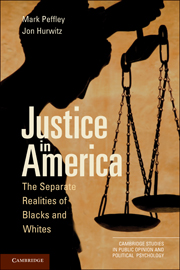Book contents
- Frontmatter
- Contents
- List of Tables
- List of Figures
- Acknowledgments
- 1 Introduction
- 2 Racial Bias in the Justice System
- 3 The Role of Fairness
- 4 The Consequences of Fairness
- 5 The Consequences of Fairness
- 6 Conclusions
- Appendix A National Survey and Survey Items
- Appendix B Examining Reciprocal Effects of Unfair Treatment and Neighborhood Discrimination
- References
- Index
- Titles in the series
3 - The Role of Fairness
Published online by Cambridge University Press: 05 June 2012
- Frontmatter
- Contents
- List of Tables
- List of Figures
- Acknowledgments
- 1 Introduction
- 2 Racial Bias in the Justice System
- 3 The Role of Fairness
- 4 The Consequences of Fairness
- 5 The Consequences of Fairness
- 6 Conclusions
- Appendix A National Survey and Survey Items
- Appendix B Examining Reciprocal Effects of Unfair Treatment and Neighborhood Discrimination
- References
- Index
- Titles in the series
Summary
In the previous chapter, we examined the dramatically different experiences of Whites and African Americans in the criminal justice system. After discussing the historical and criminological documentation for such interracial differences, we focused on the experiences of the National Race and Crime Survey (NRCS) respondents – experiences that are felt personally and vicariously. Unsurprisingly, we found that African Americans are substantially more likely to report being treated unfairly by the police relative to Whites, particularly Blacks who are younger males, liberal, better educated, and living in high-crime communities.
We also explored vicarious experiences – or perceptions that Blacks are treated discriminatorily in their communities by the police and the courts. Although we were not surprised to find that Blacks see discrimination differently from Whites, we were not prepared for the enormity of the divide between how Blacks and Whites evaluate the severity of the problem. Overwhelming majorities of African Americans, but only trivial percentages of Whites, perceive problems of racial discrimination as being “serious,” regardless of whether the problem is defined in terms of courts giving harsher sentences to Blacks, police stopping and questioning Blacks disproportionately, or police caring more about crimes committed against Whites than against Blacks.
Most importantly, contrary to the conventional wisdom that personal experiences rarely translate into more general perceptions, we found a strong association among African Americans between personal discriminatory treatment during encounters with police officers and their perceptions of discrimination in the community.
- Type
- Chapter
- Information
- Justice in AmericaThe Separate Realities of Blacks and Whites, pp. 68 - 110Publisher: Cambridge University PressPrint publication year: 2010



